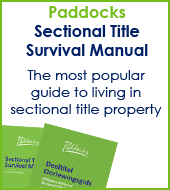By Jennifer Paddock

Q1: Please advise whether fines or penalties for contravention of the conduct rules can be imposed for persistent transgressors.
A1: Neither the Sectional Titles Act nor the prescribed rules provide for the imposition of fines or penalties on apparent transgressors of a scheme’s conduct rules.
It is possible for a body corporate to adopt a rule, either a management rule by unanimous resolution or a conduct rule by special resolution, which gives the trustees the authority to impose fines on persons found guilty of breaching a conduct rule, but such a rule will only be valid and enforceable if it complies with the principles of natural justice – particularly audi alteram partem, which means “let both sides be heard”. In the context this means that the apparent transgressor must be summonsed to a hearing at which he has an opportunity to state his case. If the trustees then find that the person is guilty of breaching the conduct rules, they can impose a reasonable fine.
It is important to note that for a fining rule to be enfoceable it must be carefully drafted. I would therefore recommend that you employ the services of an attorney specialising in sectional titles to draft it for the body corporate.
Outstanding levies
Q2: Is there a standard procedure for recovering outstanding levies? Can the trustees draft and implement a procedure or is approval by the owners required?
A2: The usual procedure used to collect arrear levies is to hand over the defaulter to a collections attorney who will use the court process to recover the money for the body corporate.
Something the trustees may consider before going this route is to resolve by majority vote to charge interest on arrear amounts at such a rate as they may determine from time to time. This may serve as a deterrent for owners considering not paying their levies and will ensure that the body corporate ultimately does not lose any money.
Hot water installation issues
Q3: I am the owner of a flat located on the ground floor of a two-storey block. The hot water cylinder (HWC) that supplies my flat is located under the tiles in the roof space above the upper flat’s ceiling. Who is liable for payment should the HWC need repairs or replacement and who is liable for any damages incurred whilst such work is being carried out?
A3: The answers to your questions are contained in prescribed management rule 68(1)(vii), which says:
“In addition to his obligations in terms of section 44 of the [Sectional Titles] Act, an owner shall maintain the hot water installation which serves his section, or, where such installation serves more than one section, the owners concerned shall maintain such installation pro-rata, notwithstanding that such appliance is situated in part of the common property and is insured in terms of policy taken out by the body corporate.”
Article reference: Paddocks Press: Volume 5, Issue 8, Page 7
Recent Posts
Recent Comments
- Graham Paddock on Body Corporate Functions: Insurance
- Graham Paddock on Spending body corporate funds
- Graham Paddock on The Levy Clearance Certificate: The Body Corporate’s Cheap & Effective Weapon
- Graham Paddock on The benefits of online sectional title meetings
- Heinz Wiesner on The benefits of online sectional title meetings
Archives
- June 2025
- May 2025
- April 2025
- March 2025
- February 2025
- January 2025
- December 2024
- November 2024
- October 2024
- August 2024
- July 2024
- June 2024
- May 2024
- April 2024
- March 2024
- February 2024
- January 2024
- December 2023
- November 2023
- October 2023
- September 2023
- August 2023
- July 2023
- June 2023
- May 2023
- April 2023
- March 2023
- February 2023
- January 2023
- December 2022
- November 2022
- October 2022
- September 2022
- August 2022
- July 2022
- June 2022
- May 2022
- April 2022
- March 2022
- February 2022
- January 2022
- December 2021
- November 2021
- October 2021
- September 2021
- August 2021
- July 2021
- June 2021
- May 2021
- April 2021
- March 2021
- February 2021
- January 2021
- December 2020
- November 2020
- October 2020
- September 2020
- August 2020
- July 2020
- June 2020
- May 2020
- April 2020
- March 2020
- February 2020
- January 2020
- December 2019
- November 2019
- October 2019
- September 2019
- August 2019
- July 2019
- June 2019
- May 2019
- April 2019
- March 2019
- February 2019
- January 2019
- December 2018
- November 2018
- October 2018
- September 2018
- August 2018
- July 2018
- June 2018
- May 2018
- April 2018
- March 2018
- February 2018
- January 2018
- December 2017
- November 2017
- October 2017
- September 2017
- August 2017
- July 2017
- June 2017
- May 2017
- April 2017
- March 2017
- February 2017
- January 2017
- December 2016
- November 2016
- October 2016
- September 2016
- August 2016
- July 2016
- June 2016
- May 2016
- April 2016
- March 2016
- February 2016
- January 2016
- December 2015
- November 2015
- October 2015
- September 2015
- August 2015
- July 2015
- June 2015
- May 2015
- April 2015
- March 2015
- February 2015
- January 2015
- December 2014
- November 2014
- October 2014
- September 2014
- August 2014
- July 2014
- June 2014
- May 2014
- April 2014
- March 2014
- February 2014
- January 2014
- December 2013
- November 2013
- October 2013
- September 2013
- August 2013
- July 2013
- June 2013
- May 2013
- April 2013
- March 2013
- February 2013
- January 2013
- December 2012
- November 2012
- October 2012
- September 2012
- August 2012
- July 2012
- June 2012
- May 2012
- April 2012
- March 2012
- February 2012
- January 2012
- December 2011
- November 2011
- October 2011
- September 2011
- August 2011
- July 2011
- June 2011
- May 2011
- April 2011
- March 2011
- February 2011
- January 2011
- December 2010
- November 2010
- October 2010
- September 2010
- August 2010
- July 2010
- June 2010
- May 2010
- April 2010
- March 2010
- February 2010
- January 2010
- December 2009
- November 2009
- October 2009
- September 2009
- August 2009
- July 2009
- June 2009
- March 2009
- February 2009
- February 2008
- February 2007

1 Comment.
1. what is the procedure for the body corporate to impose penalties
2. can the body corporate impose penalties for non compliance with the municipality’s laws in this case the certificate of occupation
3. Can the body corporate grant extension of up to 24 months to some owners who did not have occupancy certificates and not extend the same to other owners who are also non compliant